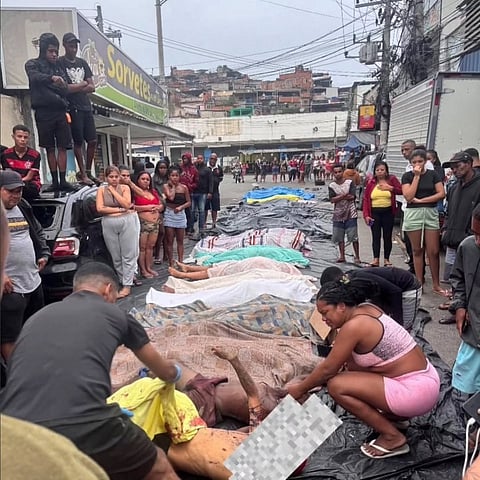

At least 64 people, including four police officers, died in Rio de Janeiro's most lethal police operation ever, targeting the Comando Vermelho gang in the Alemao and Penha favela complexes.
The operation involved 2,500 security personnel and occurred days before the city hosts the C40 global summit of mayors and Prince William's Earthshot Prize.
These events are part of preparations for the United Nations climate summit COP30 in Belem from November 10 to November 21.
Rio has a history of large-scale raids against criminal groups prior to major international gatherings, including the 2016 Olympics, the 2024 G20 summit, and the July BRICS summit.
Governor Claudio Castro confirmed the death toll on Tuesday, stating it more than doubled the previous record for a single police action.
"We stand firm confronting narcoterrorism," Castro wrote on social media.
The raid, described by state government as the largest ever against Comando Vermelho, resulted in 81 arrests while serving 250 warrants targeting drug kingpins and money laundering.
Police seized over 200kg of drugs and dozens of firearms.
Gangs responded with gunfire, burning cars to block armored vehicles, and using drones armed with grenades.
Videos released by police showed suspects fleeing into forested areas.
At least 50 of the deceased were indicated by police as suspected criminals.
Dozens were injured, including civilians in crossfire, disrupting schools, medical facilities, bus routes, and traffic.
On Wednesday morning, a Reuters witness saw more than 40 bodies on a street in Penha, brought by residents searching for missing relatives.
An updated death toll is expected later Wednesday.
The UN Human Rights Office expressed horror at the operation and urged prompt investigations.
Justice Minister Ricardo Lewandowski noted the federal government received no support request from state authorities and followed developments via media.
Civil society groups criticized the heavy casualties in the military-style approach.
"This is a completely failed approach, because it does not actually target the links in the drug production chain," said Carolina Ricardo, executive director at Sou da Paz think tank.
The favelas, home to about 300,000 people, were likened to a war zone, with roads remaining closed.
The area near Rio's international airport serves as a headquarters for the gang, which has been expanding territory and drug routes.
Some suspects are from a faction in Pará state hiding in Rio.